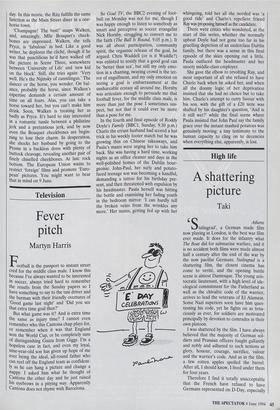Television
Fever pitch
Martyn Harris
Football is the passport to instant street cred for the middle class male. I know this because I've always wanted to be interested in soccer, always tried hard to remember the results from the Sunday papers so I have something to say to the taxi driver and the barman with their friendly overtures of Good game last night' and 'Did you see that extra time goal then?' But what game was it? And is extra time the same as injury time? I cannot even remember who this Cantona chap plays for, or remember when it was that England won the World Cup, or be completely sure of distinguishing Gazza from Giggs. I'm a hopeless case in fact, and even my loyal, nine-year-old son has given up hope of me ever being the ideal, all-round father who can reel off the England team as confident- ly as he can hang a picture and change a nappy. I asked him what he thought of Cantona the other day and he just raised his eyebrows in a pitying way. Apparently Cantona does not rhyme with Barcelona. So Goal TV, the BBC2 evening of foot- ball on Monday was not for me, though I was happy enough to listen to somebody as smart and perceptive as soccer evangelist Nick Hornby, struggling to convert me to the faith (The Ball Is Round, 9.05 p.m.). It was all about participation, community spirit, the orgasmic release of the goal, he argued. Chris Waddell (or is it Waddle?) was enlisted to testify that a good goal can be 'better than sex', but still my only emo- tion in a chanting, swaying crowd is the ter- ror of engulfment, and my only emotion on seeing a goal is embarrassment at the unshareable ecstasy all around me. Hornby was articulate enough to persuade me that football fever, for the middle class male, is more than just the pose I sometimes sus- pect, but not that it could ever be more than a pose for me, In the fourth and final episode of Roddy Doyle's Family (BBC1, Sunday, 9.30 p.m.) Charlo the errant husband had scored a hat trick in his weekly footer match but he was growing thin on Chinese takeaways, and Paula's mates were urging her to take him back. She was having a hard time, working nights as an office cleaner and days in the well-polished homes of the Dublin bour- geoisie. John-Paul, her surly and potato- faced teenage son was becoming a handful, demanding a tattoo for his birthday pre- sent, and then threatened with expulsion by his headmaster. Paula herself was hitting the bottle and examining her fading youth in the bedroom mirror: 'I can hardly tell the broken veins from the wrinkles any more.' Her mates, getting fed up with her
whingeing, told her all she needed was 'a good ride' and Charlo's repellent friend Ray was proposing himself as the candidate.
There were critics who wondered, at the start of this series, whether the normally upbeat Doyle had not gone too far in his gruelling depiction of an underclass Dublin family, but there was a sense in this final episode of the skies opening out a little. Paula outfaced the headmaster and her snooty middle-class employer.
She gave the elbow to revolting Ray, and most important of all she refused to have Charlo back when he asked her, and when all the doomy logic of her deprivation insisted that she had no choice but to take him. Charlo's attempt to curry favour with his son, with the gift of a £20 note was shafted by his daughter's question, 'And is it still wet?' while the final scene where Paula insisted that John Paul say the family grace over the instant mashed potatoes was genuinely moving: a tiny testimony to the human capacity to cling on to decencies when everything else, apparently, is lost.


























































 Previous page
Previous page